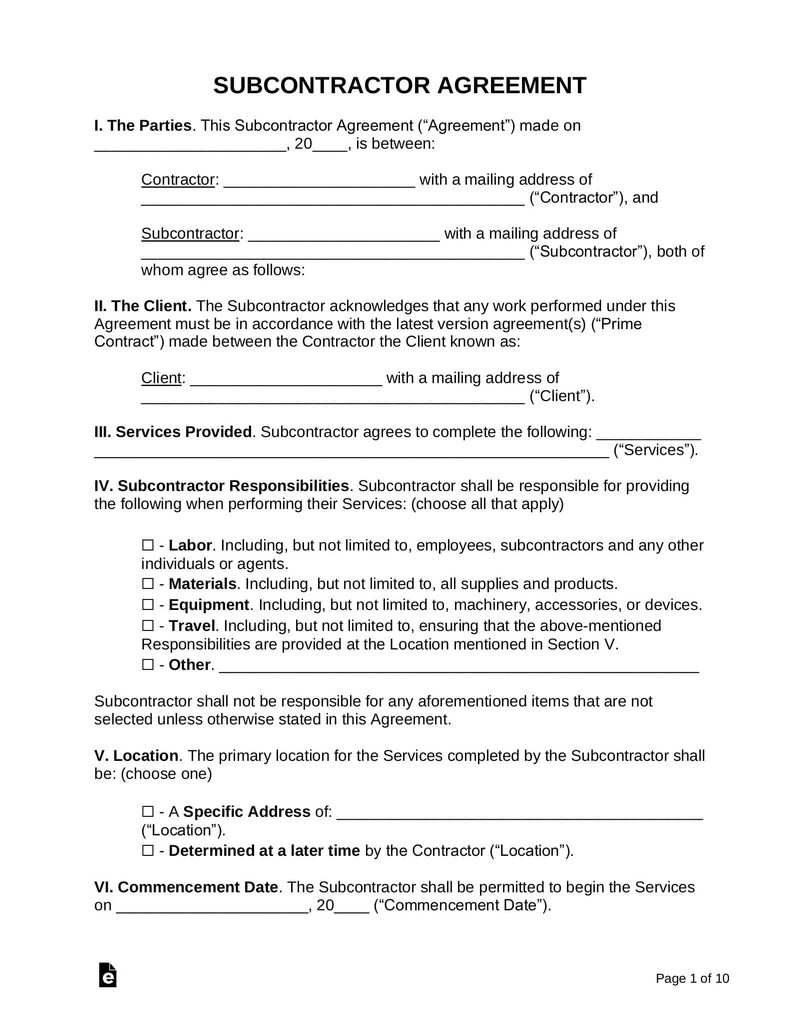Suppose you’re hiring independent contractors for specific projects. In that case, be aware that they are self-employed workers with completely different job responsibilities, especially between contractor vs subcontractor.
No worries. We have researched 4 key differences between contractor and subcontractor you may be concerned about. Check out the article below.

Who Are Contractors?
An independent contractor works for themselves, not as an employee, but under a contract for someone else. They agree to work on a specific project for a specific timeframe, control their pay rates and work schedule, and have to pay self-employment tax on their earnings.
The IRS examines workers such as lawyers, doctors, accountants, auctioneers, veterinarians, dentists, public stenographers, contractors, subcontractors, and independent contractors who offer services to other businesses through an independent contractor agreement (see the image below).

Liabilities Of Contractor
A contractor, whether a general contractor or subcontractor, faces a range of potential liabilities depending on the project and their role. Let’s see some common one:
- The contractor is responsible for thoroughly inspecting all Corporation-loaned tools and equipment for defects.
- If defects are noticed, the Contractor must immediately notify the Corporation, return the items, and refrain from using them.
- The Commercial General Liability Insurance policy maintained by the Contractor must include coverage for any liability assumed by the Contractor associated with using, supervising, and training personnel using the loaned equipment.
- Any liability arising from a claim for breach of warranty under Clause 2.1 (Contractor’s Warranties and Undertakings) is additional and without prejudice to any other present or future liability of the Contractor to the Authority.
- The contractor is entitled to rely on any limitation or exclusion of liability and raise equivalent rights in defense of liability in any action or proceedings brought by the Authority under the Agreement.
Who Are Subcontractors?
Subcontractors are experts in a particular field of work and are often hired by independent contractors for a specific task on a project. While subcontractors decide their terms of work, their payment depends on the range offered to the contractor. Subcontractors are often other independent or self-employed individuals and, therefore, responsible for paying their taxes.
When you hire a subcontractor, you pay a self-employed individual for a short-term project, but you are not employing them directly. A subcontractor works for the person or entity contracted to the job (contractor) through a signed contract (see the image below), instead of establishing a direct agreement with you.

Liabilities Of Subcontractor
A subcontractor can be liable for several things, depending on the specific situation and their contract. Below are some common subcontractor liabilities:
- The subcontractor is liable for completing the work they agreed to in the contract according to the specified quality standards and deadlines. If they fail to meet these expectations, they could be liable for damages, rework, or even contract termination.
- If the subcontractor’s work is faulty or defective, they can be liable for fixing the problems. This could include repairing poor-quality work or replacing faulty materials.
- If the subcontractor’s delays cause the entire project to run behind schedule, they may be responsible for any damages caused. This could include financial penalties outlined in the contract.
Now that you know the definition of each term, let’s move on to the difference between subcontractor and contractor.
3 Differences Between Contractor vs Subcontractor
Contractor vs subcontractor collaborate on the same projects, but each is responsible for separate tasks. The difference between subcontractor and contractor lies in 4 components:
- Salary
- Work Schedule
- Responsibilities
| Feature | Contractor | Subcontractor |
| Salary | Sets their own rates, averaging $24.65/hour | Averages $27.62/hour, varies by skill |
| Work Schedule | Flexible, can choose hours and clients | Less flexible, follows contractor’s schedule, and may work long hours |
| Responsibilities | Manages projects, finds clients, secures contracts | Performs specific tasks within the project |
Salary
The first difference between a contractor and a subcontractor is the salary. According to Indeed Salaries, as reported until 03/2024, contractors in the United States earn an average of $27.78 per hour. However, contractors set their own rates depending on their experience, skills, and location.
Subcontractors make an average of $30.26 per hour, as reported until 03/2024. Their skill level greatly affects their salary, with the lowest being $14.05 per hour, as reported until 03/2024, and the highest being about $65.17 per hour, as reported until 03/2024. Subcontractors find work through contractors, which can affect their earnings.
Work Schedule
As a contractor, you own a flexible work schedule. Hence, you must adjust your workload to match your client’s availability.
Subcontractors have less flexible schedules since the contractor brings in all the clients. This means that subcontractors must follow the work schedule assigned by the contractor (usually stated on a contract). Subcontractors often work long hours to complete a project on time.
Responsibilities
The main difference in responsibility between contractors and subcontractors lies in their scope of work:
Contractor:
- Hired directly by the client
- Handles the entire project, including coordinating with subcontractors
- Responsible for all aspects of the project to the client, including quality, budget, and deadlines
- Has a broader range of responsibilities, including project management, finances, permits, and customer satisfaction
Subcontractor:
- Hired by the contractor to complete specific tasks within the project
- Specializes in a particular trade or service (e.g., electrician, plumber, carpenter)
- Responsible for their specific work to the contractor, as outlined in the subcontract agreement
- Focuses on delivering their expertise efficiently
Final Thoughts
The contractor vs subcontractor discussion highlights the key differences between the two terms. However, if you are self-employed and struggling with local and international payments, consult ERA’s global Employer of record (EOR) expert.
Multiplier makes hiring independent contractors hassle-free. Our EOR solution helps you build and manage remote teams worldwide and expand into newer markets. We can also help you onboard contractors from a global talent pool and handle their payroll.
See the benefits of EOR at 5 Best Employer Of Record Benefits Company Should Know (Expert Shared)
Frequently Asked Questions
What Is The Difference Between Contractors And Subcontractors?
There are two types of workers when hiring individuals for a job:
- A contractor is typically hired to carry out specific tasks
- A subcontractor is brought in to offer services to contractors when they lack the necessary qualifications or experience.
What Is An Example Of A Contractor And A Subcontractor?
A building contractor may recruit a subcontractor to handle the electrical wiring portion of their job. The contractor is responsible to their client for the entire job, including the part that the subcontractor performs.
What Is The Difference Between a Contractor And an A Prime Contractor?
The differences between a contractor and a prime contractor are:
- Prime contractors earn more per project than subcontractors because they work on the entire project.
- The subcontractor works only on a part. However, the number of projects a subcontractor can work on in a given time affects their annual pay, which depends on their schedule and demand.
What Is The Difference Between A Contractor And Subrecipient?
The key differences between a contractor and a sub-recipient are:
- A contractor is an organization or person awarded a contract to perform specific work.
- A sub-recipient is a non-federal organization that acquires a sub-award from a pass-through entity to manage a part of a national program. It’s important to note that an individual who benefits from such a program is not considered a subrecipient.
See more related articles
What Is Contractor Compliance?
What Is Contractor Compliance?
Understanding Contractor Workers’ Compensation
Consultant vs Contractor: 4 Fundamental Differences
Difference Between Vendor vs Contractor: What Should Employers Know?
Freelancer vs Contractor: Understanding The Key Differences
Ms. Tracy has worked in human resource consulting for over 15 years. A driven entrepreneur focused on business expansion and people development. She previously worked as Country Manager for an international Australia firm that specializes in global workforce management, as well as several key roles as Business Growth Director and Executive Search Director for both large local firms to effectively drive their business growth. A strong emphasis is placed on aligning organizational priorities/objectives with business needs. She has a large network of local business leaders and a thorough understanding of the local market.









